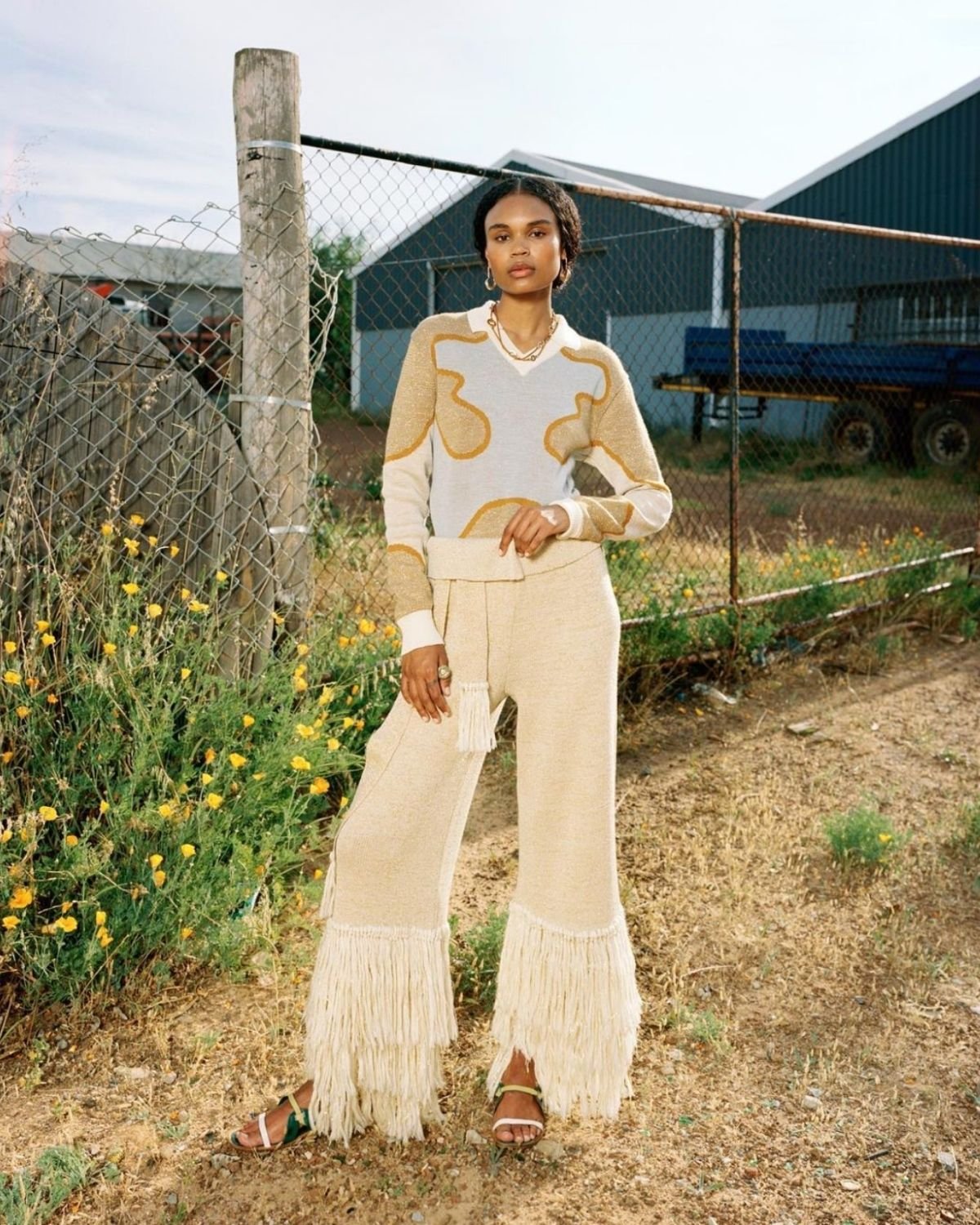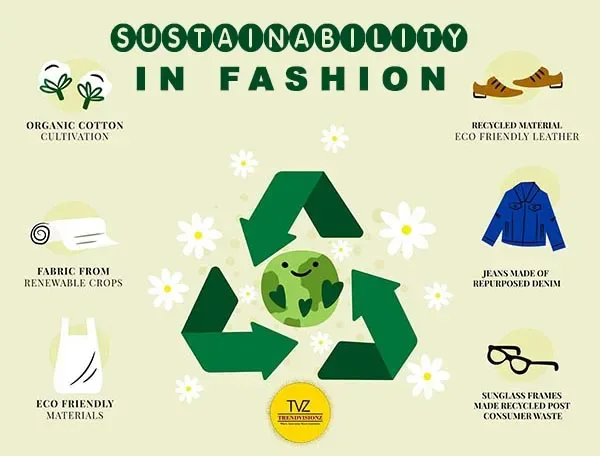Cape Town Sustainable Fashion: Honest Clothing for a Better World
Wiki Article
Keep Ahead of the Contour by Checking Out Ingenious Fashion Trends
In an industry as dynamic as style, remaining in advance includes more than just adhering to existing fads-- it demands an exploration of innovation. Smart fabrics, as an example, are transforming garments right into useful work of arts, while 3D printing is transforming design procedures with its personalized, waste-reducing abilities. As sustainability becomes a cornerstone, innovations like eco-friendly products and circular style techniques are reshaping environmental duty - Cape Town Sustainable Fashion. Moreover, the convergence of modern technology and style declares a brand-new age of consumer involvement. Exactly how, after that, can these emerging trends redefine the future of style, and what implications do they hold for brand names seeking to grow in this progressing landscape?
Welcoming Smart Textiles
Over the last few years, the garment industry has experienced a transformative change with the assimilation of smart textiles, an innovative technology that mixes modern technology with fabric. This evolution represents not only a combination of visual appeals and functionality but likewise a considerable jump in the direction of sustainability and customization in vogue. Smart textiles, also called e-textiles, embed advanced electronics such as sensing units and conductive strings within the textile, making it possible for garments to connect with the environment or the wearer.These fabrics are made to monitor physical criteria, such as heart price or body temperature level, offering real-time health analytics. Beyond wellness applications, clever fabrics are likewise being utilized for adaptive apparel, which can transform shade or pattern in reaction to environmental stimulations, hence using a dynamic fashion experience.
In addition, the growth of energy-harvesting textiles that generate power from activity or sunshine is leading the way for self-dependent wearable technology. This advancement is attracting environmentally mindful consumers and developers aiming to lower the ecological footprint of style. As r & d in this field advance, clever textiles are anticipated to end up being increasingly widespread, reshaping the landscape of modern-day fashion with their multifunctional capabilities.
The Increase of 3D Printing
Transforming the production landscape, 3D printing has become a game-changer in the garment industry. This advanced technology has enabled designers to press the limits of creative thinking, producing elaborate and tailored garments that were previously unbelievable. By leveraging digital layout and additive manufacturing, 3D printing assists in the creation of complicated geometries and patterns, permitting designers to explore new textures and frameworks.A notable advantage of 3D printing in vogue is its capacity to create on-demand, minimizing waste and minimizing supply requirements. This performance not just maximizes manufacturing procedures but additionally permits quick prototyping, allowing developers to bring their visions to life in a much shorter timeframe. Furthermore, 3D printing supports personalization somewhat unrivaled by standard techniques, providing customized fits and one-of-a-kind layouts customized to individual consumer choices.
The rise of 3D printing has actually also democratized fashion, making it easily accessible to emerging designers that can currently fabricate high-quality items without substantial monetary investment in typical production framework. As modern technology remains to advancement, the garment industry is positioned to harness the complete possibility of 3D printing, exploring brand-new products and strategies that will definitely redefine how fashion is conceived and generated.
Sustainable Fashion Developments
As the apparel industry faces the pushing need for environmental obligation, sustainable style developments have emerged at the leading edge of transformative adjustment. The growing understanding of ecological influence has sustained a change towards even more eco-conscious methods and materials. Brands and designers are currently focusing on sustainability, incorporating techniques that lessen waste and minimize carbon impacts.One substantial development is the increase of circular fashion, which emphasizes recycling and upcycling to prolong the lifecycle of garments. This approach not only reduces waste yet also motivates customers to adopt a much more mindful method to clothes usage. In addition, the use of lasting materials, such as natural cotton, hemp, and recycled polyester, has gained grip. These materials need much less water and energy during manufacturing, dramatically decreasing environmental influence.
One more development depends on the adoption of ingenious dyeing techniques that use waterless processes or natural dyes, thereby decreasing the vast quantities of water and chemicals traditionally used in fabric dyeing. Furthermore, innovations in biotechnology have led to the production of lab-grown leather and textiles, using eco friendly and cruelty-free choices to standard products. Via these pioneering initiatives, the fashion business is making purposeful strides towards a much more sustainable future.

Tech-Integrated Clothing
Tech-integrated apparel stands for a groundbreaking blend of fashion and modern technology, improving just how people engage with their garments. This cutting-edge domain name is marked by the incorporation of clever textiles and ingrained digital elements, boosting both performance and visual charm. From fitness trackers embedded in sportswear to heated coats controlled via smart device applications, tech-integrated apparel offers customers unprecedented ease and versatility.Pioneering brands are driving this pattern, concentrating on creating garments that reply to ecological stimuli or individual commands. As an example, some garments can change color or pattern in reaction to temperature changes, while others integrate biometric sensing units to monitor health and wellness metrics click over here now like heart rate or tension levels. The smooth integration of technology into textiles additionally includes ecological sustainability, with initiatives to create self-cleaning textiles or garments that get used to weather problems, More Info therefore lessening the need for numerous layers.
Additionally, the arrival of wearable innovation is not simply limited to clothes however reaches devices like watches and glasses, additional widening the range of tech-integrated fashion. As the sector remains to innovate, the capacity for customization and personalization in garments expands, using customers distinct, tech-enhanced fashion experiences that satisfy their specific needs and choices.
Future of Virtual Fashion
Recently, the future of virtual style has emerged as a transformative pressure within the market, leveraging advancements in digital modern technology to redefine exactly how fashion is created, experienced, and consumed. By incorporating increased truth (AR), online fact (VR), and 3D layout devices, designers can currently craft immersive and interactive experiences that go beyond conventional fashion boundaries. Digital fashion allows for the creation of garments that exist solely in digital environments, supplying unlimited opportunities for innovation without the limitations of physical production.This digital shift not just presents opportunities for innovative expression yet also addresses sustainability issues inherent in conventional style methods. Cape Town Sustainable Fashion. By getting rid of the demand for physical sources, online fashion minimizes waste and minimizes carbon footprints. Additionally, the rise of virtual style lines up with the enhancing customer demand for distinct and customized experiences, as online garments can be customized and customized to specific choices easily

Final Thought
The style market's future lies in the assimilation of ingenious technologies and sustainable practices. Virtual fashion is poised to redefine customer communications.In recent years, the fashion industry has actually observed a transformative shift with the combination of smart fabrics, a link cutting-edge development that blends technology with material.As the fashion industry grapples with the pressing requirement for ecological obligation, sustainable fashion advancements have actually arised at the center of transformative change.In recent years, the future of virtual style has emerged as a transformative force within the industry, leveraging developments in electronic modern technology to redefine just how style is developed, experienced, and eaten. The rise of online style aligns with the increasing consumer demand for special and individualized experiences, as digital garments can be personalized and tailored to individual preferences with ease.
The fashion industry's future lies in the integration of lasting practices and cutting-edge modern technologies.
Report this wiki page